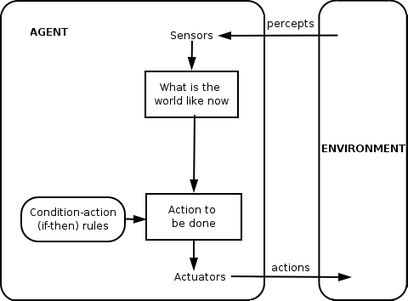
Back وكيل ذكي Arabic Интелигентен агент Bulgarian বুদ্ধিমান কারক Bengali/Bangla Agent intel·ligent Catalan KI-Agent German Ευφυής πράκτορας Greek Agente inteligente (inteligencia artificial) Spanish عامل هوشمند Persian Agent intelligent French Axente intelixente Galician

In artificial intelligence, an intelligent agent is an entity that perceives its environment, takes actions autonomously to achieve goals, and may improve its performance through machine learning or by acquiring knowledge. Leading AI textbooks define artificial intelligence as the "study and design of intelligent agents," emphasizing that goal-directed behavior is central to intelligence.
A specialized subset of intelligent agents, agentic AI (also known as an AI agent or simply agent), expands this concept by proactively pursuing goals, making decisions, and taking actions over extended periods, thereby exemplifying a novel form of digital agency.[1]
Intelligent agents can range from simple to highly complex. A basic thermostat or control system is considered an intelligent agent, as is a human being, or any other system that meets the same criteria—such as a firm, a state, or a biome.[2]
Intelligent agents operate based on an objective function, which encapsulates their goals. They are designed to create and execute plans that maximize the expected value of this function upon completion.[3] For example, a reinforcement learning agent has a reward function, which allows programmers to shape its desired behavior.[4] Similarly, an evolutionary algorithm's behavior is guided by a fitness function.[5]
Intelligent agents in artificial intelligence are closely related to agents in economics, and versions of the intelligent agent paradigm are studied in cognitive science, ethics, and the philosophy of practical reason, as well as in many interdisciplinary socio-cognitive modeling and computer social simulations.
Intelligent agents are often described schematically as abstract functional systems similar to computer programs. To distinguish theoretical models from real-world implementations, abstract descriptions of intelligent agents are called abstract intelligent agents. Intelligent agents are also closely related to software agents—autonomous computer programs that carry out tasks on behalf of users. They are also referred to using a term borrowed from economics: a "rational agent".[2]
- ^ Mukherjee, Anirban; Chang, Hannah (2025-02-01). "Agentic AI: Expanding the Algorithmic Frontier of Creative Problem Solving". SSRN 5123621.
- ^ a b Russell & Norvig 2003, chpt. 2.
- ^ Bringsjord, Selmer; Govindarajulu, Naveen Sundar (12 July 2018). "Artificial Intelligence". In Edward N. Zalta (ed.). The Stanford Encyclopedia of Philosophy (Summer 2020 Edition).
- ^ Wolchover, Natalie (30 January 2020). "Artificial Intelligence Will Do What We Ask. That's a Problem". Quanta Magazine. Retrieved 21 June 2020.
- ^ Bull, Larry (1999). "On model-based evolutionary computation". Soft Computing. 3 (2): 76–82. doi:10.1007/s005000050055. S2CID 9699920.